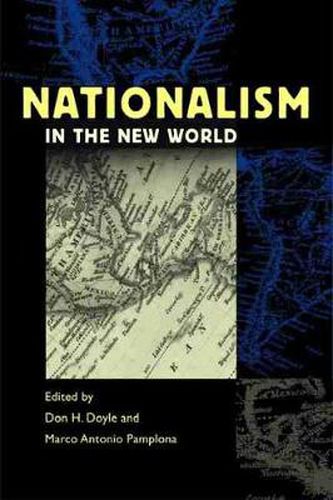Readings Newsletter
Become a Readings Member to make your shopping experience even easier.
Sign in or sign up for free!
You’re not far away from qualifying for FREE standard shipping within Australia
You’ve qualified for FREE standard shipping within Australia
The cart is loading…






Nationalism in the New World brings together work by scholars from the United States, Canada, Latin America, and Europe to discuss the common problem of how the nations of the Americas grappled with the basic questions of nationalism: Who are we? How do we imagine ourselves as a nation? Debates over the origins and meanings of nationalism have emerged at the forefront of the humanities and social sciences over the past two decades. However, these discussions have been mostly about nations in Europe, the Middle East, Asia, or Africa. In addition, their focus is usually on the violence spawned by ethnic and religious strains of nationalism, which have been largely absent in the Americas. The contributors to this volume
Americanize
the conversation on nationalism. They ask how the Americas fit into the larger world of nations and in what ways they present distinctive forms of nation-hood. Such questions are of particular importance because, as the editors write,
the American nations that came into being in the wake of revolutions that shook the Atlantic world beginning in 1776 provided models of what the modern world might become.
American nations were among the first nation-states to emerge on the world stage. As former colonies with multiethnic populations, American nations could not logically rest their claim to nationhood on ancient bonds of blood and history. Out of a world of empires and colonies the independent states of the Americas forged new nations based on a varied mix of modern civic ideals instead of primordial myths, on ethnic and religious diversity instead of common descent, and on future hopes rather than ancient roots.
$9.00 standard shipping within Australia
FREE standard shipping within Australia for orders over $100.00
Express & International shipping calculated at checkout
Nationalism in the New World brings together work by scholars from the United States, Canada, Latin America, and Europe to discuss the common problem of how the nations of the Americas grappled with the basic questions of nationalism: Who are we? How do we imagine ourselves as a nation? Debates over the origins and meanings of nationalism have emerged at the forefront of the humanities and social sciences over the past two decades. However, these discussions have been mostly about nations in Europe, the Middle East, Asia, or Africa. In addition, their focus is usually on the violence spawned by ethnic and religious strains of nationalism, which have been largely absent in the Americas. The contributors to this volume
Americanize
the conversation on nationalism. They ask how the Americas fit into the larger world of nations and in what ways they present distinctive forms of nation-hood. Such questions are of particular importance because, as the editors write,
the American nations that came into being in the wake of revolutions that shook the Atlantic world beginning in 1776 provided models of what the modern world might become.
American nations were among the first nation-states to emerge on the world stage. As former colonies with multiethnic populations, American nations could not logically rest their claim to nationhood on ancient bonds of blood and history. Out of a world of empires and colonies the independent states of the Americas forged new nations based on a varied mix of modern civic ideals instead of primordial myths, on ethnic and religious diversity instead of common descent, and on future hopes rather than ancient roots.